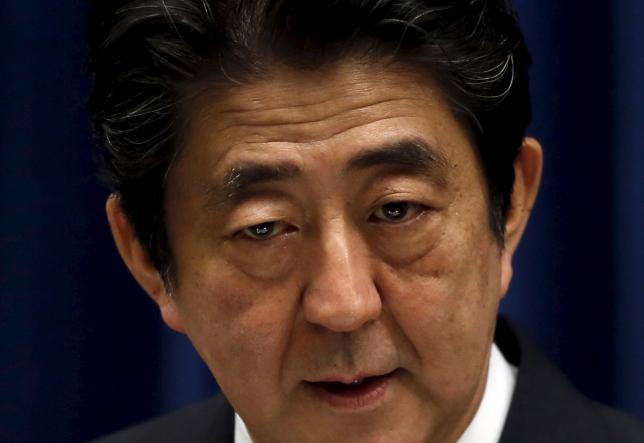Japan's Abe keeps allies in key posts as attention returns to economy
TOKYO: Japanese Prime Minister Shinzo Abe retained close allies in key posts in a cabinet reshuffle on Wednesday, playing it safe as he refocuses on the economy after enacting divisive security legislation that dented his popularity.
Nine of the 19 cabinet members kept their portfolios, including Chief Cabinet Secretary Yoshihide Suga, Finance Minister Taro Aso and Economics Minister Akira Amari.
Defence Minister Gen Nakatani and Foreign Minister Fumio Kishida also stayed on, said Suga, who announced the new line-up at the prime minister's office.
Maverick lawmaker Taro Kono, a frequent government critic, was appointed minister for administrative reform, a position similar to that he held in Abe's Liberal Democratic Party (LDP).
Abe tapped veteran lawmaker Motoo Hayashi, 68, for the trade and industry portfolio, replacing Yoichi Miyazawa after just over one year.
Hiroshi Hase, a former teacher and professional wrestler, will also replace Hakubun Shimomura as education minister.
Shimomura had said he would stand down over missteps that forced the scrapping of plans for a new national stadium as the centrepiece of the Tokyo 2020 Olympics.
Abe's attempt to boost his ratings with a broad cabinet make-over, including five women, backfired in September 2014 when two ministers quickly resigned over scandals. This time, as expected, he opted for stability as he refocuses on the economy after the unpopular security legislation passed.
Abe also promoted Katsunobu Kato, a deputy chief cabinet secretary, to a new post in charge of his latest goal to build a "Society in Which All 100 Million People Can be Active".
The slogan, Abe aides say, is meant to show that all Japanese will be included in economic growth. However, some have said it echoes wartime propaganda.
Kato also takes over the job of promoting a more active role by women in society, one of Abe's pet policies. The number of women in the cabinet, however, dropped to three from five.
He will coordinate policies to raise the low fertility rate and reform Japan's creaking social security system.
Koichi Hagiuda, an LDP aide to Abe, replaces Kato. Hagiuda, 48, has caused headaches for Abe's government with outspoken comments on Japan's wartime past, a topic that often frays ties with China.
Abe has been trying to demonstrate renewed commitment to fixing the stale economy. He recently unveiled three new policy "arrows" that aides say subsume an original trio of hyper-easy monetary policy, public spending and reform.
The new targets are to expand the economy by one-fifth to 600 trillion yen ($5 trillion), boost the fertility rate and reform the overburdened social welfare system.
The Bank of Japan (BOJ) refrained from expanding stimulus earlier on Wednesday, even as slumping exports and falling oil prices threaten its projection that the economy is on track to hit its 2 percent inflation target next year.
Fears of recession will keep the BOJ under pressure to ease when it meets again on Oct. 30.






